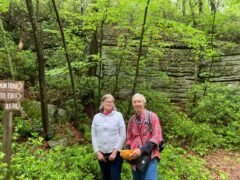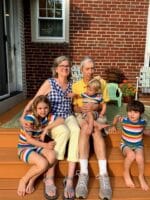William, Primary Central Nervous System Lymphoma
William, Primary Central Nervous System Lymphoma Survivor

Life always fills your mind with things to hope for. Some of these hopes are mundane and realistic; my wife and I always hope to see our children and grandchildren more often. Some are extravagant and uncontrollable; gamblers hope to win the lottery.
After my lymphoma diagnosis, my mind filled with hope for clarity. What does it mean for the way my life is now; for the way it may be tomorrow? How many tomorrows will there be? What should I do now? So, my story of hope, after cancer descends like a bolt-from-the-blue, is a story about finding clarity in the midst of the storm, and new hope, both mundane and extravagant, once the storm has passed.
My story of hope, after cancer descends like a bolt-from-the-blue, is a story about finding clarity in the midst of the storm, and new hope, both mundane and extravagant, once the storm has passed.
The path to cancer survivorship that my wife Dee and I followed (always together) started fifteen years ago when I was admitted to the hospital following an emergency room visit after a seizure. That night, I had a visit in my hospital room from a surgeon who I had never seen before. He said that images from the ER showed lesions in my brain and recommended surgery to obtain a tissue sample the next day.
There are many possible paths from that starting point. Hope of finding the right one is built on trust. Brain surgery without trust-building deliberation did not feel like the right first step- in fact, our trust in the medical profession was not at a high point at that moment. The seizure had been preceded by other troubling symptoms involving speech and balance, and at first, other doctors had initiated treatments believing that I may have had multiple mini-strokes.
For us, the first step along the path to surviving this new reality of a possible brain cancer was trusting ourselves and our caring family. Family contacts led us to Johns Hopkins Hospital where we met amazing doctors experienced with brain cancers and eventually a whole team who earned our trust with sympathy and professional bearing. We found ourselves speaking frankly about our fears and getting thoughtful, respectful advice. A brain surgeon did the biopsy and referred us to a young neuro-oncologist, who appeared at our first visit radiating vitality and planting a seed of hope. “You have primary central nervous system lymphoma.” (PCNSL) she said. “You are lucky. This is a brain cancer we know how to treat.”
To make a long story short, she led us along a winding, occasionally rocky, three-year-long path that involved three courses of treatment.
Year 1. The cancer emerged undiminished by the first course. She, who we now considered our neuro-oncologist, prescribed a confident change of course.
Year 2. Complete response to the new regimen, methotrexate + retuxamab! My wife and I celebrated with our first trip to Paris.
Year 3. Four months after Paris, I relapsed. Demoralized after the recurrence, but with the encouragement of our trusted team at Hopkins, we regrouped and sought second opinions, ultimately choosing a protocol that had never been tried at Johns Hopkins before. Our neuro-oncologist would not call it salvage therapy, a tone-deaf way that we had heard other oncologists sometimes refer to third tier treatments. It was, she assured us, in fact, our best hope, and helped line up the team that would be needed to carry it through.
I feel a need to return some of my gratitude to the community of patients, caregivers and medical professionals who are dealing with new cancer diagnoses daily.

Year 15. Now, twelve cancer-free years after that third course of treatment, a high-dose chemotherapy cocktail with autologous stem cell rescue, I think more about grace than my personal cancer journey. I feel a need to return some of my gratitude to the community of patients, caregivers and medical professionals who are dealing with new cancer diagnoses daily.
What I hope is that by telling my story here, in prose, or in phone conversations with newly diagnosed patients through peer-to-peer counseling programs, or in patient advocacy work, I can provide a trusted, even if remote and disembodied, voice that can help lymphoma patients construct a narrative of hope for themselves.
Dee and I recently returned from a visit with our son, his wife, and their two children in California. We live in Delaware, but we are a close family in the sense that 3,000 miles seems too far, and three time zones too out of phase to be comfortable. These days, (especially with Covid precautions,) it is our hope just to be with them often enough to build up a memory bank of joint experiences large enough to bridge those gaps in time and distance. This is, we realize, a very mundane hope among grandparents. As long-term survivors of PCNSL we are so thankful to feel like typical doting grandparents.
Our California son and daughter-in-law had not yet met at the time, fifteen years ago, when I was diagnosed. We could not have dared to hope, then, for the joys that have come with adding new daughters-and-sons-in-law and now, four young grandchildren to our family. Maybe we did win the lottery.
